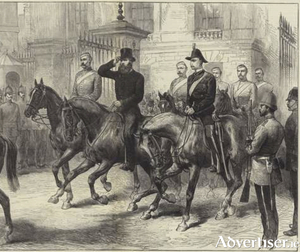Search Results for 'House of Commons'
63 results found.
Grealish calls for a cap on the number of TDs elected to the Dáil

Galway West Independent TD Noel Grealish has called for a cap on the number of TDs elected to Dáil Éireann.
Galway University? a ‘godless College’
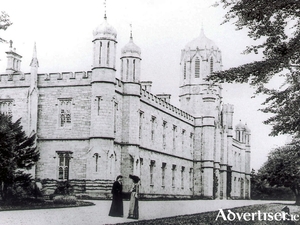
After Catholic Emancipation where for the first time Catholics won the right to be elected and to sit in the House Of Commons, the English government, led by an enlightened Robert Peel, believed it would be worth extending emancipation to third level education.
The Protestant Boys orphanage at Clifden
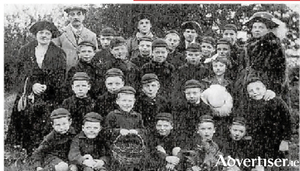
Even though the National Army ousted the anti-Treaty forces from Clifden in August 1922, they had not gone away. They still remained a threatening force, well armed and determined. Ever since the Black and Tan war the so called Connemara Flying Column, still under the leadership of Peter McDonnell, Gerald Bartley and others, were firmly on the anti-Treaty side. They were familiar with the path-ways and mountain hide-outs, which made them virtually invisible in times of pursuit.
Dr Connolly admits to taking ‘the occasional glass of ale’
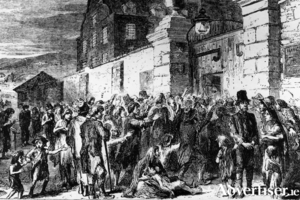
The complaint made against Dr Connolly, the medical officer of the Moycullen dispensary district in October 1876, for neglect of duty, drunkenness and using improper language on the evening that Patrick Barrett’s wife was gravely ill in child-labour, was taken very seriously by the Local Government Board. At a disastrous first meeting between the Board’s inspector, Dr T Brodie, with the members of the Dispensary Committee, and Connolly, Connolly completely lost his rag. He insulted the committee, claiming they were ganging up against him, and had pushed himself against the committee’s chairman, John Kyne, in a threatening manner. So it must have been with some interest that the Board awaited a letter from Connolly offering some explanation for his extraordinary behaviour. Of course the letter, when it arrived, was charm itself. Connolly immediately stated that Mrs Anne Barrett ‘sustained no injury’ from the time between the ticket (supplied by the Relieving Officer, which entitles the bearer to a free service), delivered to the doctor’s housekeeper, and ‘the few hours delay’, that the doctor took to see the patient. Furthermore the doctor claimed he was frightened of Patrick Barrett’s, threats. His housekeeper was alarmed when she heard Barrett say that ‘he would have the doctor’s life’. The letter went on to say that Tom Conneely, Barrett’s brother-in-law, who accompanied Barrett that night, was asked the next day about the patient, repeated that Barrett had said, if ‘the doctor goes to Ballinahalia he will not return alive’. Of course this was a blatant lie. Conneely worked for John Geraghty, the most powerful man in Moycullen, who owned a pub, and the post-office. In addition he was the poor-law rate collector, and a friend of Dr Connolly. The doctor’s letter goes on to explain that a few years ago a gentleman’s windows were smashed at night, and that the police had questioned Barrett about the incident. ‘A threat from such a person’, the doctor wrote, ‘might justly excite terror’.
Distraught husband said doctor was drunk
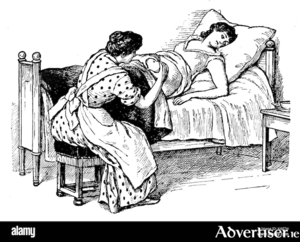
On October 2 1876 Patrick Barrett of Ballynahalia, wrote a long letter to Dr T Brodie, the Local Government Board inspector, bitterly complaining about Doctor James Connolly, who failed, ‘through drunkenness’, to promptly attend his heavily pregnant wife. Barrett demanded a sworn inquiry into the whole sorry business, causing a row that fiercely divided the community of Moycullen, where old loyalties silenced witnesses from giving evidence, leading to a stunning finale of bribery and corruption that would turn the one street county Galway village into a Ken Bruen landscape. Barrett, accompanied by his brother-in-law Tom Conneely, set out briskly to call Dr Connolly, the local dispensary doctor, as his wife, Anne, was dangerously ill in child labour. The doctor’s housekeeper told them the doctor was gone into Moycullen, and not expected home till around 10pm. The two men walked to Moycullen as fast as they could. Just as they passed John Turner’s public-house they saw the doctor standing by the wall. The doctor began to move off towards John Geraghty’s pub, when Barrett asked him to come to his home immediately as his wife was very ill. The doctor asked: ‘Have you a ticket? (at that time for a doctor to make a home-visit a ticket had to be got from Mr Griffin, the Relieving officer for the area), Barrett said ‘No’, but if the doctor came he would get a ticket later. The doctor then asked Barrett to give him one shilling for his fee, to which Barrett replied that he had no money. Doctor Connolly turned away saying: ‘Go to the devil, or to the poor-house’, followed by abusive and derogatory language too unseemly to be included in the report. The doctor walked away leaving Barrett ‘excited’, and at the point where he almost lost his temper; but instead, he thought he would have the law on him. ‘Do I have to go into Galway to get a doctor?’ he asks.
Distraught husband said doctor was drunk
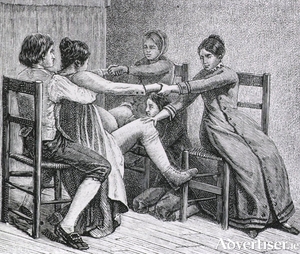
On October 2 1876 Patrick Barrett of Ballynahalia, wrote a long letter to Dr T Brodie, the Local Government Board inspector, bitterly complaining about Doctor James Connolly, who failed, ‘through drunkenness’, to promptly attend his heavily pregnant wife. Barrett demanded a sworn inquiry into the whole sorry business, causing a row that fiercely divided the community of Moycullen, where old loyalties silenced witnesses from giving evidence, leading to a stunning finale of bribery and corruption that would turn the one street county Galway village into a Ken Bruen landscape. Barrett, accompanied by his brother-in-law Tom Conneely, set out briskly to call Dr Connolly, the local dispensary doctor, as his wife, Anne, was dangerously ill in child labour. The doctor’s housekeeper told them the doctor was gone into Moycullen, and not expected home till around 10pm. The two men walked to Moycullen as fast as they could. Just as they passed John Turner’s public-house they saw the doctor standing by the wall. The doctor began to move off towards John Geraghty’s pub, when Barrett asked him to come to his home immediately as his wife was very ill. The doctor asked: ‘Have you a ticket? (at that time for a doctor to make a home-visit a ticket had to be got from Mr Griffin, the Relieving officer for the area), Barrett said ‘No’, but if the doctor came he would get a ticket later. The doctor then asked Barrett to give him one shilling for his fee, to which Barrett replied that he had no money. Doctor Connolly turned away saying: ‘Go to the devil, or to the poor-house’, followed by abusive and derogatory language too unseemly to be included in the report. The doctor walked away leaving Barrett ‘excited’, and at the point where he almost lost his temper; but instead, he thought he would have the law on him. ‘Do I have to go into Galway to get a doctor?’ he asks.
A different type of politics was needed
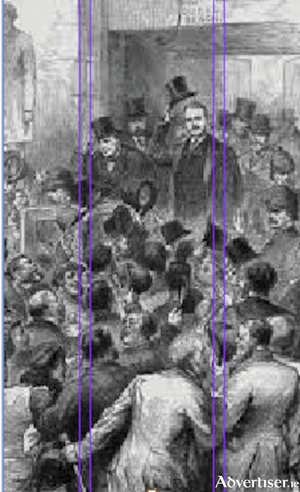
When Mitchell Henry entered Westminster parliament in 1871 he went with hope in his heart and a mission to tell the British people the precarious circumstances of the Irish tenant farmer. In many ways he resembled Jefferson Smith in the Frank Cappa film ‘Mr Smith Goes to Washington’ where a naive, idealistic young man has plans to change America.* Mitchell Henry, a liberal, kindly man, had plans to be a voice for the Irish tenant farmer within, what he believed, was a paternalistic landlord system, but he walked into a political cauldron, waiting to explode.
From Barna to Westminster
‘Definitely, I am a Galway girl, very much so, I’m from Barna’, Claire Hanna MP replies when asked where exactly she is from. Claire was on one of her regular visits from her home in Belfast to her birthplace in Barna, Co. Galway, when we sat down last week to discuss her journey from rural county Galway to the House of Commons in Westminster.
‘The peasantry are the foundation of the world - the upper classes get worn out’
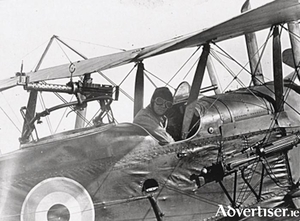
In the decades preceding the 1916 Rising, an extraordinary revolution had already taken place in rural Ireland. The British government had lost its patience with Irish landlords who owned 95 per cent of the land of Ireland (100 percent of county Galway was landlord owned), and had largely squandered their wealth leaving themselves vulnerable to poor harvests, successive seasons of bad weather, and an increasingly impoverished tenantry.
